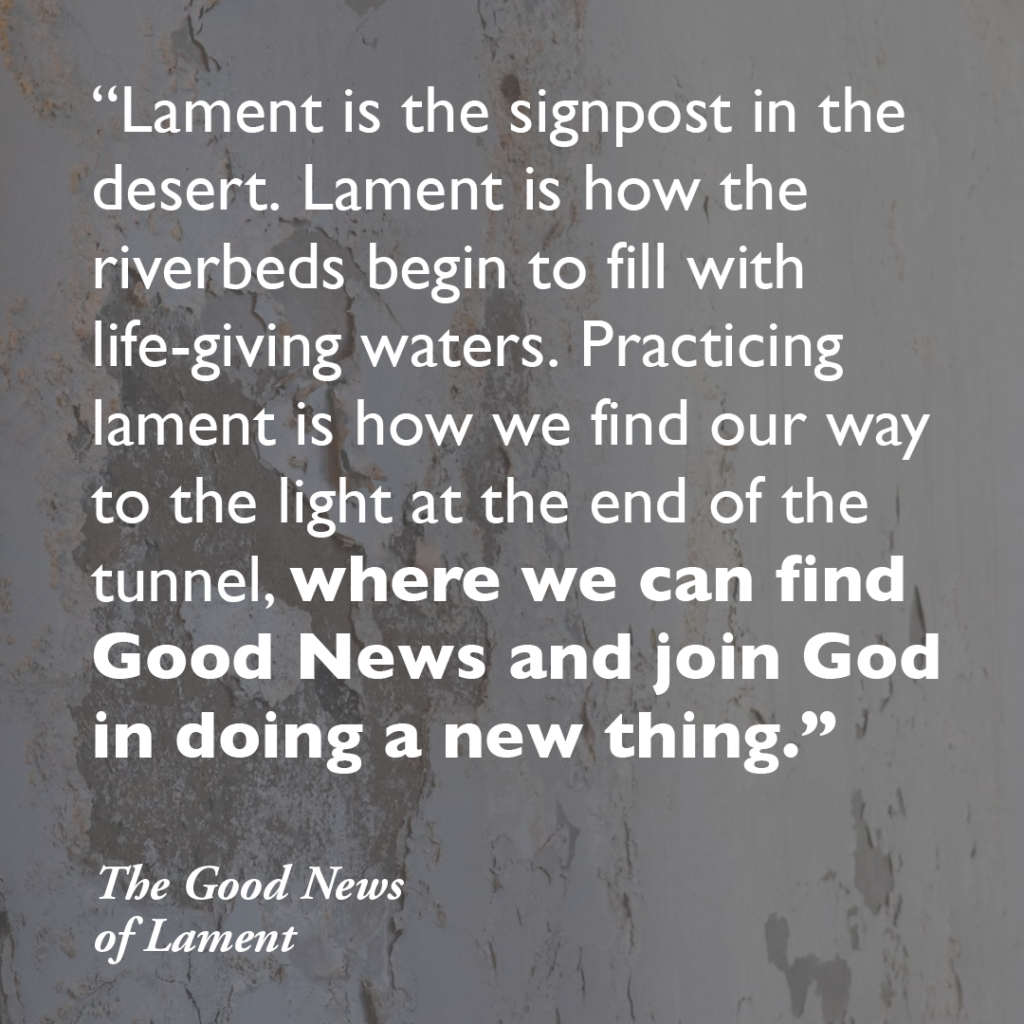By: Jerusalem Greer, Staff Officer for Evangelism
Awake, O Lord! why are you sleeping?
Arise! do not reject us for ever.
Why have you hidden your face
and forgotten our affliction and oppression?
We sink down into the dust;
our body cleaves to the ground.
Rise up, and help us,
and save us, for the sake of your steadfast love.
– Psalm 44:23-26
We sink down to the dust. Or, as another translation says, we are “flat on our faces in the dirt.” For many of us, this is where we find ourselves – flat on our faces in the dirt, wondering: Where is God? When will we receive God’s promises of redemption and restoration in our lives, in our neighborhoods, and in our country? Is there any Good News left to be found?
I am not a person naturally drawn to the practice of lament. I would rather find the glass half-full and keep on the sunny side of life. I would prefer to keep pain and heartbreak at arm’s length.
But that is not how life and growth work.
Change doesn’t happen by pretending that everything is fine. No, in order to truly find the light at the end of the tunnel, we must brave the tunnel and keep walking. To reach the light, we must do the necessary work.
In an interview with Micky Jones, theologian Walter Brueggemann said, “The laments in the books of Psalms and Lamentations are all an expression of grief, but they are also an expression of hope. They are an insistence that things cannot remain this way and they must be changed.”

It is in this spirit that we offer The Good News of Lament – a set of resources to help us express our grief and our hope. Resources that will guide and fortify us as we insist that things cannot remain this way – they must be changed. The earth and all of creation cannot continue to be abused in ways that lead to further disease. Our black and brown siblings cannot continue to be persecuted through unjust killings and lack of healthcare access. Our unsheltered neighbors cannot continue to be swept up and discarded like trash in the street. Our poor and our immigrants cannot continue to be neglected and punished or labeled someone else’s problem. The education of children cannot remain unbalanced according to class or wealth. The safety of schools cannot continue to be politicized. And the dignity of all persons, including those of our LGBTQ+ communities, cannot continue to be up for debate.
To lament the state of things means we must bring our grief, our anger, our sadness, our heartbreak, and our frustration before God. To lament is to cry out, “Enough!” and then look for the hope that arrives through the cracks in our façade of “just fine.”
When we allow ourselves space and time to lament fully, to reach the point of saying, “No more, O Lord, no more,” we begin the process of turning from what was to what could be. It is here in this crack of grief and pain that God begins the work of helping us turn from the powers of sin, hatred, fear, injustice, and oppression toward the way of truth, love, hope, justice, and freedom. It is here that we see the hope reflected in the words of Isaiah 43:18-19:
Do not remember the former things,
or consider the things of old.
I am about to do a new thing;
now it springs forth, do you not perceive it?
I will make a way in the wilderness
and rivers in the desert.
Lament is the signpost in the desert. Lament is how the riverbeds begin to fill with life-giving waters. Practicing lament is how we find our way to the light at the end of the tunnel, where we can find Good News and join God in doing a new thing.
Visit our Good News of Lament page to find a list of multimedia resources, including a sermon by the Rev. Dr. Tricia Lyons of Virginia Theological Seminary.
